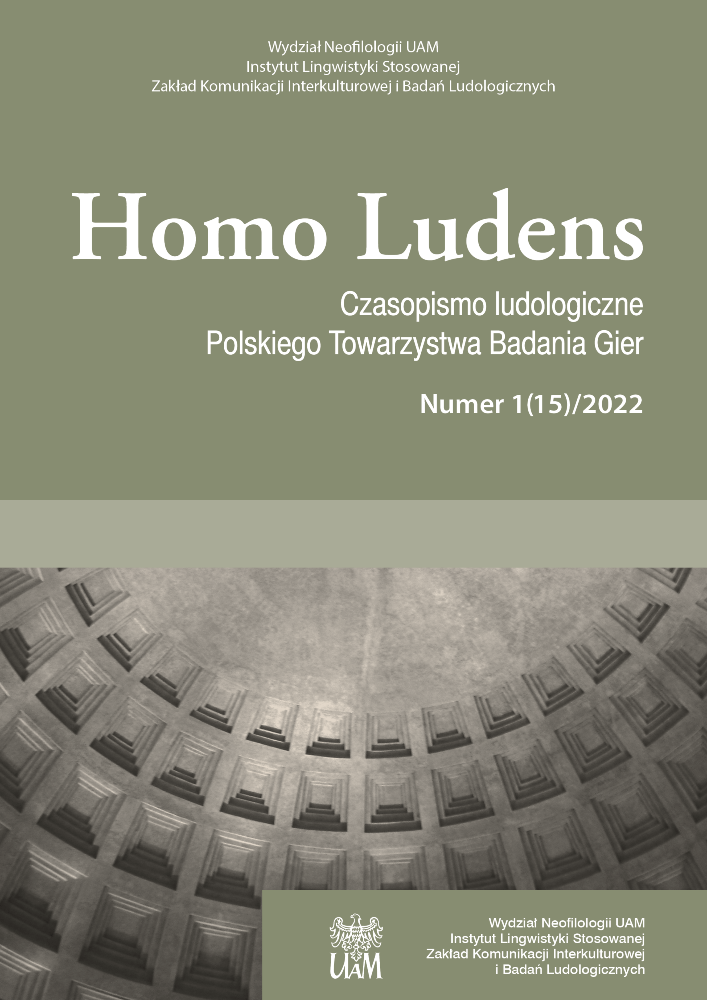Abstract
This paper examines the strategies employed in the medieval role-playing game (RPG) Kingdom Come: Deliverance (2018) to deliver and contextualise lore, or historical & background knowledge, to the player. These strategies are compared to the approach employed in other RPGs, in particular the faux-medieval fantasy The Elder Scrolls V: Skyrim (2011). It is argued Kingdom Come actively seeks to highlight the historical status of its content, projecting an impression of historical clarity, only occasionally highlighting uncertainty. By contrast, Skyrim conveys its lore in a nuanced and playful way that seems to acknowledge the limitations of the historical process.
References
Bártfai, I. (2018, February). Cumans in Kingdom Come: Deliverance. Medievalists.net. Online: <https://www.medievalists.net/2018/02/cumanskingdom-come-deliverance>. Date of access: 29 December 2021.
Bogost, I. (2007a). Persuasive Games: The Expressive Power of Videogames. Cambridge: The MIT Press. DOI: https://doi.org/10.7551/mitpress/5334.001.0001
Bojo, O., Bigas, J., & Princ, Z. (2021, February 21). Deliverance: The making of Kingdom Come. DENPozitiva. Online: <https://www.youtube.com/watch?v=gyrR37s-N5Q>. Date of access: 17 November 2021.
Copplestone, T. J. (2017). But that’s not accurate: The differing perceptions of accuracy in cultural-heritage videogames between creators, consumers and critics. Rethinking History, 21(3), 415–438. DOI: https://doi.org/10.1080/13642529.2017.1256615
DOI:10.1080/13642529.2017.1256615 DiPietro, M. (2014). Author, text, and medievalism in The Elder Scrolls. In D. T. Kline (Ed.), Digital gaming reimagines the Middle Ages (pp. 202–213). New York: Routledge.
Eco, U. (1987). Dreaming of the Middle Ages. In U. Eco, Travels in Hyperreality (pp. 61–72). London: Picador. DOI: https://doi.org/10.2307/40142717
Ferrari, S. (2010). The Judgment of Procedural Rhetoric. Unpublished master’s thesis. Atlanta: Georgia Institute of Technology.
Genette, G. (1997). Paratexts: Thresholds of Interpretation. Cambridge: Cambridge University Press.
Grayson, N. (2018, February 3). Kingdom Come owes its popularity to “realism” and conservative politics. Kotaku. Online: <https://kotaku.com/kingdom-come-owes-its-popularity-to-realism-and-conserv-1823420208>. Date of access: 17 November 2021).
Jenkins, H. (2004). Game design as narrative architecture. In N. Wardrip-Fruin & P. Harrigan (Eds.), First person: New media as story, performance, and game (pp. 118–130). Cambridge: The MIT Press.
Johnson, M. R. (2020). The place of culture, society, and politics in video game world-building. In M. J. P. Wolf (Ed.), World-builders on worldbuilding: An exploration of subcreation (pp. 110–131). Abingdon: Routledge. DOI: https://doi.org/10.4324/9780429242861-7
Kingdom Come: Deliverance (n.d.). Online: <https://www.kingdomcomerpg.com>. Date of access: 20 June 2022.
Kingdom Come: Deliverance (2018). Steam. Online: https://store.steampowered.com/app/379430/Kingdom_Come_Deliverance>. Date of access: 20 June 2022.
Kingdom Come: Deliverance (2019). Kickstarter. Online: <https://www.kickstarter.com/projects/1294225970/kingdom-come-deliverance>. Date of access: 20 June 2022.
Kochanowicz, R. (2014). Fabularyzowane gry komputerowe w przestrzeni humanistycznej: Analizy, interpretacje i wnioski z pogranicza poetyki, aksjologii, dydaktyki literatury. Poznań: Wydawnictwo Naukowe UAM.
Let’s Play History (18 January 2018). The most “authentic” historical game of all time?! The enormous inclination of “Kingdom Come: Deliverance”.
Let’s Play History. Online: <https://lepetitcapo.wordpress.com/2018/01/13/das-authentischste-historienspiel-aller-zeiten-die-gewaltige-schraeglage-von-kingdom-come-deliverance/>. Date of access: 16 November 2021.
Maj, K. M. (2015). Allotopie: Topografia światów fikcjonalnych. Kraków: Universitas.
Maj, K. M. (2019). Światotwórstwo w fantastyce. Od przedstawienia do zamieszkiwania. Kraków: Universitas.
Majewski, J. (2018). “The Elder Scrolls V”: Skyrim and its audience as a worldbuilding benchmark for indigenous virtual cultural heritage. Unpublished doctoral thesis. Gold Coast: Bond University.
Majewski, J. (17 June 2021). Książki jako narzędzie konstruowania światów wirtualnych na przykładzie serii gier fabularnych “The Elder Scrolls”. Paper presented at the conference “Pismo – Kultura – Technologie”, Warsaw University, Warsaw.
Majewski, J., & Bielińska-Majewska, B. (2018, October 9). Video games for the Palaeolithic: A case study of Echo: Secrets of the Lost Cavern. Article presented at the conference Interactive Pasts II, The Netherlands Institute for Sound and Vision, Hilversum. Online: <https://www.youtube.com/watch?v=cgm9YfWmqz0>. Date of access: 20 June 2022.
McCarter, R. (2 March 2018). Kingdom Come: Deliverance – Myth-making and historical accuracy. Unwinnable. Online: https://unwinnable.com/2018/03/02/deliverance-myth-making-and-historical-accuracy/>. Date of access: 17 November 2021.
Mochocki, M. (2021). Role-play as a heritage practice. Abingdon: Routledge. DOI: https://doi.org/10.4324/9781003130956
Pfister, E. (2019). Kingdom Come: Deliverance. A Bohemian forest simulator. Gamevironments, issue 11, 142–148.
Taylor, L. (2018, February 7). Kingdom Come: Deliverance still fails to deliver representation. New Normative. Online: <http://newnormative.com/2018/02/07/kingdom-come-deliverance-still-fails-deliverrepresentation/>. Date of access: 29 December 2021.
Vavra, D. (2018, May 25). Designing historical open world RPG. Digital Dragons (YouTube Channel). Online: <https://www.youtube.com/watch?v=puXwyIDCQCg>. Date of access: 7 June 2017.
Warhorse Studios (12 February 2021). Fechtbuch: The real swordfighting behind Kingdom Come. Warhorse Studios (YouTube Channel). Online: <https://www.youtube.com/watch?v=yxsNZ7XD_jQ>. Date of access: 17 November 2021.
Webster, A. (2018, February 2). Kingdom Come: Deliverance is an RPG that trades fantasy for historical accuracy. The Verge. Online: <https://www.theverge.com/2018/2/2/16964080/kingdom-come-deliverancehistory-rpg-ps4-xbox-pc>. Date of access: 17 November 2021.
White, W. J. (2014). The right to dream of the Middle Ages: Simulating the medieval in tabletop RPGs. In D. T. Kline (Ed.), Digital gaming reimagines the Middle Ages (pp. 15–28). New York: Routledge.
Wolf, M. J. P. (2012). Building imaginary worlds: The theory and history of subcreation. New York: Routledge.
Wolf, M. J. P. (2020). Appendix: Types of world-building. In M. J. P. Wolf (Ed.), World-builders on world-building: An exploration of subcreation (pp. 143–148). Abingdon: Routledge. DOI: https://doi.org/10.4324/9780429242861
Wright, A. (2020). Honour, deliverance, legacy: Representations of the Middle Ages in digital gaming. Unpublished master’s thesis. Huddersfield: University of Huddersfield.
Bethesda Game Studios (2011). The Elder Scrolls V: Skyrim [multiplatform]. Bethesda Softworks, USA.
CD Projekt Red (2015). The Witcher 3: Wild Hunt [multiplatform]. CD Projekt, Poland.
Kheops Studios (2005). Echo: Secrets of the Lost Cavern [PC]. The Adventure Company, Canada.
Origin Systems (1990). Ultima VI: The False Prophet [PC]. Origin Systems, USA.
Warhorse Studios (2018). Kingdom Come: Deliverance [multiplatform]. Deep Silver, Austria.
License

This work is licensed under a Creative Commons Attribution-NonCommercial-NoDerivatives 4.0 International License.
Szczegółowe informacje dotyczące prawa autorskiego zawarte są w umowie podpisywanej między wydawcą a autorem.
